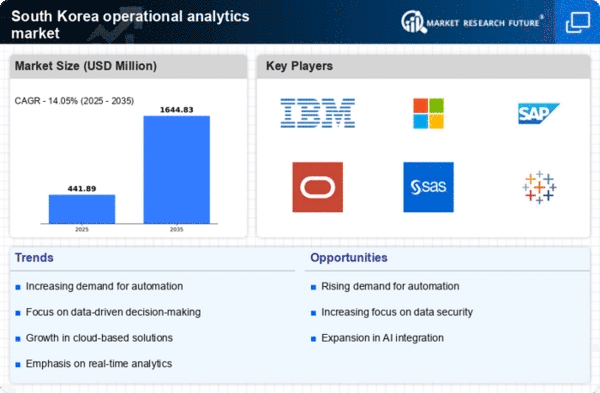Rising Adoption of IoT Technologies
the operational analytics market is driven by the rising adoption of Internet of Things (IoT) technologies across various sectors in South Korea. As more devices become interconnected, the volume of data generated is increasing exponentially. Businesses are leveraging operational analytics to process and analyze this data, enabling them to gain valuable insights into operational performance. The IoT market in South Korea is expected to grow at a CAGR of 15% over the next five years, suggesting a corresponding increase in demand for analytics solutions that can handle complex data streams and provide actionable insights.
Increasing Demand for Real-Time Insights
The operational analytics market in South Korea is experiencing a surge in demand for real-time insights. Businesses are increasingly recognizing the value of immediate data analysis to enhance decision-making processes. This trend is driven by the need for agility in operations, allowing companies to respond swiftly to market changes. According to recent data, approximately 70% of organizations in South Korea are prioritizing real-time analytics to improve operational efficiency. This shift is likely to propel the operational analytics market forward, as firms seek tools that provide instant access to critical information, thereby fostering a culture of data-driven decision-making.
Emphasis on Cost Reduction and Efficiency
In the current economic climate, South Korean businesses are placing a strong emphasis on cost reduction and operational efficiency. The operational analytics market is poised to benefit from this focus, as organizations seek to identify inefficiencies and optimize resource allocation. By utilizing analytics tools, companies can uncover insights that lead to significant cost savings. It is estimated that organizations implementing operational analytics can achieve up to a 30% reduction in operational costs. This trend indicates a growing recognition of the importance of analytics in driving financial performance and operational excellence.
Regulatory Compliance and Risk Management
the operational analytics market in South Korea is influenced by the growing need for regulatory compliance and effective risk management. As industries face increasing scrutiny from regulatory bodies, organizations are turning to analytics to ensure compliance with various standards and regulations. This trend is particularly evident in sectors such as finance and healthcare, where data integrity and security are paramount. Companies are investing in operational analytics tools to monitor compliance metrics and mitigate risks, indicating a robust demand for solutions that can support regulatory adherence and enhance overall operational resilience.
Growth of E-Commerce and Digital Transformation
The operational analytics market is significantly influenced by the rapid growth of e-commerce and digital transformation initiatives in South Korea. As online retail continues to expand, businesses are increasingly leveraging operational analytics to optimize supply chains, enhance customer experiences, and streamline operations. Reports indicate that the e-commerce sector in South Korea is projected to reach $100 billion by 2025, creating a substantial demand for analytics solutions. This growth is likely to drive investments in operational analytics tools, enabling companies to harness data effectively and maintain a competitive edge in the digital landscape.
















